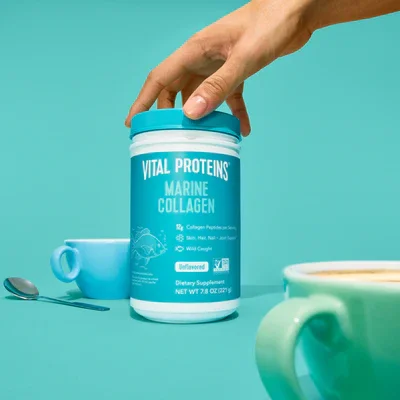✨ Collagen: The Protein That Holds You Together
What is Collagen?
Collagen is the most abundant protein in your body — think of it as the “glue” that supports your skin, joints, bones, muscles, and even your gut lining. As we age, collagen production naturally slows down, which is why we start noticing wrinkles, joint stiffness, and reduced muscle support.
Why Consider Collagen Supplements?
Scientific evidence is growing to support collagen’s benefits across skin, joint, and bone health.
A systematic review and meta-analysis found that oral collagen supplementation significantly improved skin elasticity and hydration:
“Hydrolyzed collagen supplementation was shown to increase skin hydration, elasticity, and density in randomized controlled trials.”
(Int J Dermatol, 2021)A 90-day clinical trial using 5 g/day of collagen peptides demonstrated that participants had significant improvement in skin texture and elasticity compared to placebo.
(Borumand & Sibilla, 2014)
Collagen for Joint Health
Collagen’s role isn’t just cosmetic — it also helps joints.
In patients with osteoarthritis, daily type II collagen reduced joint pain and stiffness:
“Undenatured type II collagen was more effective than glucosamine and chondroitin in improving joint comfort.”
(Crowley et al., Nutrition Journal, 2009)A recent meta-analysis confirmed that collagen peptides provided statistically significant relief for knee osteoarthritis pain with no added risk of side effects.
(Zhu et al., J Orthop Surg Res, 2023)
Collagen and Bone Strength
Collagen also supports bone health. In postmenopausal women, supplementation with bioactive collagen peptides improved bone mineral density, helping to counteract age-related bone loss.
(König et al., Nutrients, 2018)
Professional vs. Store-Bought Collagen
Over-the-counter collagen (like Vital Proteins’ original Collagen Peptides) provides general support. But professional-grade formulations — such as Vital Proteins Professional Daily Foundational Support — go further by including:
Clinically studied peptides (Verisol®, Fortibone®, Fortigel®) to target skin, bone, and joint cells.
Liposomal vitamin C to boost absorption and collagen synthesis.
Third-party testing and clean formulations.
🌱 What If You Don’t Eat Meat?
Most collagen supplements are sourced from bovine (cow), porcine (pig), or marine (fish) origins. For those who are vegetarian or vegan, this can be a barrier.
👉 If you are a Pescatarian, you can use the marine based form
Currently, there are no true “vegan collagen” powders — because collagen itself is an animal protein. However, there are plant-based alternatives called collagen boosters. These don’t contain collagen directly, but instead provide the amino acids and cofactors your body uses to make collagen naturally.
Typical ingredients in vegan collagen boosters include:
Glycine, lysine, and proline (collagen-building amino acids, sourced from plants)
Vitamin C (a cofactor required for collagen synthesis)
Zinc and copper (minerals that support collagen formation)
Plant extracts like bamboo (silica) or amla (antioxidant support)
👉 If you’re vegetarian or vegan, a collagen booster can still support skin elasticity, joint health, and overall connective tissue — though the clinical research is currently stronger for animal-derived collagen peptides.
❓ FAQ: Does Collagen Replace Protein Powder?
Even though collagen is a protein, it is not a complete protein source.
Collagen is rich in amino acids like glycine, proline, and hydroxyproline, which are great for connective tissue, but it lacks essential amino acids (like tryptophan).
Because of this, collagen cannot replace protein powders or whole-food protein sources when the goal is building or preserving muscle.
✅ Best approach:
Take 10–20 g/day of collagen for skin, joints, and bone health.
Pair it with complete proteins (meat, fish, eggs, beans, dairy, or high-quality protein powders) to meet your 20–30 g of complete protein per meal target.
Example: Add collagen to a smoothie with whey or plant protein — you’ll get the benefits of both.
👉 Collagen = targeted support for connective tissue.
👉 Protein powders/foods = complete nutrition for muscle and overall protein needs.
Together, they’re powerful allies in your wellness plan.
How to Use Collagen
Collagen peptides are flavorless and dissolve easily. Add a scoop to:
Morning coffee or tea ☕
Smoothies or protein shakes 🍓
Soups or oatmeal 🍲
Consistency matters — most studies show benefits at 10–20 g/day.
Final Thoughts
Collagen isn’t just a beauty boost — it’s a science-backed tool for skin vitality, joint comfort, and bone strength.
At LifeLongWeigh, I help patients choose professional-grade supplements, like collagen, that are tailored to their unique health goals — whether that’s graceful aging, athletic recovery, or everyday wellness.
📩 Curious if collagen is right for you? Book a consultation today or explore my professional-grade bundles in the Wellness Tools Shop.



